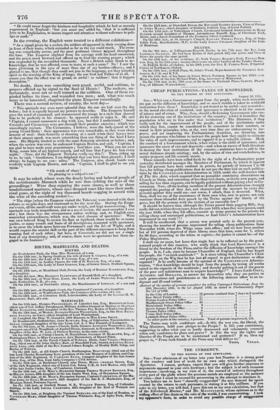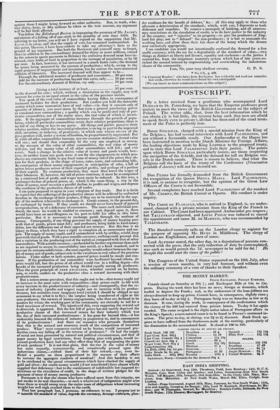THE CURRENCY.
TO THE EDITOR OF THE SPECTATOR.
SIR—Your admission of my letter into your last Number is a strong proof of the candour and love of truth for its own sake which distinguish the Spectator. I cannot, perhaps, expect that you will give further insertion to arguments opposed to your own doctrines ; but the subject is of mich immense importance—involving, in my view of it, the reward of industry throughout every part of the globe where the precious metals are employed as the measure of value—that I must be excused for persevering in the attempt to elucidate it.
You believe me to have "absurdly exaggerated" the new demand for specie created by the retina to cash payments, in stating it at fifty millions. If you refer to my letter, you will find, I gave this not as my own calculation, but that of the Ediieburgh Review,* and Mr. MACGULEOCH, whose opinions as to the trifling effect of this drain on the coin of the world, I was controverting. • I took my opponent's facts, in order to avoid any possible charge of exaggeration against those I might bring forward on other authority. But, in truth, whe- ther thirty, forty, or fifty millions be taken as the true amount, my argument will be but little affected. You follow the Edinburgh Review in impugning the accuracy of Mr. James calculation of a falling off of one-sixth in the quantity of coin since 1810. By referring to my letter, you will see I have argued on the supposition that Mr. JACOB is in error, and that the supply of corn has remained undiminished. In this point, likewise, I have been content to take my adversary's facts as the ground of my argument. But both the Reviewer and yourself seem to forget, that (in addition to the extraordinary demand for thirty or more millions, caused by the return to specie payments in Britain) the ordinary demand must have in- creased, since 1810, at least in proportion to the increase of population, or by 33 per cent. In fact, however, it has increased in a much faster ratio; the demand for money being measured by the amount of production ; which, owing to the rapid progress of improvement and invention, has far outrun the mere numerical addition of labourers. The increased demand will thus appear to be—
Through the additional number of producers and consumers 33 per cent. Add for the increase of production beyond this ratio, only 30 per cent. For the extraordinary demand of Britain, say only 10 per cent.
Giving a total increase of at least 53 per cent. in the demand for coin ; which, without a diminution in the supply, may well account for a rise to an equal extent in the value of the precious metals.
You speak of the real value of commodities having fallen in consequence of increased facilities for their production. But (unless you hold the untenable notion which some economists have of real value—viz. that it consists only of quantity of labour), you must mean by that term a general purchasing power or connnand over commodities ; a quality which can be predicated only of par- ticular commodities, not of the entire mass, the real value of which is invari- able. If the aggregate of commodities increases through the growth of popu- lation, whilst all pm ticular commodities retaiu their relative proportions, there is no fall of any thing or loss to any party. An things and parties preserve their relative position, unless the increased production is owing in part to the improved skill, invention, or industry, of producers ; in which case THEIR SHARE of the gross produce will, under a system of freedom, be proportionately augmented. But e, while all other commodities increase, any one remains stationary, its real value will rise ; and should that commodity be the very one employed as money, or the measure of the value of other commodities, the real value of money will rise, and the money value of all other commodities will fall ; and rice versa. Such a change in the relative value of money and goods would, how- ever, do neither harm nor good, were it not for the engagements to which pro- ducers are constantly liable to pay fixed sums of money out of the prices they ob- tain for their produce, in the shape of taxes, rates, rents, and outstanding bills. In consequence of these money engagements, in anticipation of sales, a fall of prices leaves producers minus of their expected profits, and perhaps of a portion of their capital. To continue production, they must then lower the wages of their labourers. If, however, the fall of prices continue, it must be accompanied by a continued loss of profit, and wages must again be reduced. In this way; a i prolonged decline of general prices, or, which s the same thing, a rise in the value of money, must occasion a parallel decline in profits and wages, and depress the condition of the productive classes of all ranks. I am quite prepared to agree in your eulog,ium of free trade. But it is futile to expect that the sufferings of the productive classes will be relieved by unlimited freedom in the exchange of their produce, if they are to be restricted in the sup- ply of the medium wherewith to exchange it. Goods cannot, in the present day, be exchanged by barter. If they could, we should never have heard of general overproduction, or of a deficiency of consumers. The more each individual pro- duced, the more he would be enabled to consume ; and, depend upon it, there would have been no unwillingness on his part to fulfil his office in this latter particular. But it is necessary to exchange goods through the medium of money. Consequently, if any thing prevents the supply of money keeping pace with that of goods, prices must fall ; and producers, being liable to fixed money debts, lose the difference out of their expected net returns. But this loss is an injury to them, which they have a right to complain of, as unnecessary and un- just. The supply of money ought, and if uninterfered with by artifice, mould, keep pacewith that of goods. With a pure metallic currency, nothing could prevent this but a variation in the producing cost of the metals as compared with that of other commodities. With a credit currency—unshackled by further regulations than such as are required to secure its convertibility into metal, at a fixed standard, and to prevent its extreme subdivision—the same equality would subsist between the sup- ply of money and of goods, subject only to the variations in real value of the precious metals. Under either or both systems, general prices would be steady and con- stant. If the production of one commodity were facilitated beyond others, its price would fall, but the prices of all others would rise in a trifling degree—the benefit of the increased production being divided equally among all producers. Thus the great principle of FREE EXCHANGE, whether carried on by barter, coin or credit, confers on the productive class a reward increasing with their productiveness.
But a notion seems prevalent, that this ought not to be—that money ought not to increase in the same ratio with commodities—that prices ought to fall with every increase in the productiveness of industry—and consequently, that the re- turns of industry (profits and wages) ought not to increase with its produc- tiveness, but maintain some imaginary level (which I should be obliged to any economist to say what is to fix) ; the surplus being transferred of right to the non-producers, the owners of money-engagements, who thus are declared to be masters for whom the working part of the community are eternally to toil for a fixed maximum of reward. The injusticebf this, even supposing the reward not to diminish, is apparent. But the late fall of prices has not merely deprived the productive classes of that increased return for their industry which was the due of their increased productiveness : it has gone far beyond this,—it has undeniably lessened, the, returns of industry in proportion to, and in consequence of its productiveness ! And there are reasoners who persuade themselves that this is the natural and necessary result of the competition of increased produce. What ! were commerce carried on by barter, would increased pro- auction cause any falling off in the returns of producers ? Or had the supply of metal not been prevented by natural and political circumstances and that of paper money by legal restrictions, from keeping pace with goods; would in- creased production have had any other effect than that of augmenting the gains of each producer ? Is it not then plain, that the rise in the value of money has most unjustly, unnecessarily, and unnaturally pressed upon the industrious classes,—robbed them of their fair reward,—nay, even in- flicted a penalty on them proportioned to the success of their efforts to increase the aggregate comforts of mankind ! And this hardship is not to be attributed to the casual circumstances which have checked the supply of gold and Silver—for credit-Money would (if not interdicted) have almost wholly supplied that deficiency—but to the continuance of indefensible law-imposed re- Strictions on the circulation of credit, in the shape of written pledges for the payment of sums of money among producers. • • . Fortunate is it that the classes who have suffered most from this iniquity, are not awake, to its real character,—or such a whirlwind of indignation might arise from them as would sweep away the entire mass of obligations whose increasing weight has well nigh crushed them to the earth.
' Your last paragraph has, I presume, no reference to me. I propose' not to "tnsettle•the standard of value, degrade the-currency, derange contracts, plun-
der creditors for the benefit of debtors," &c. : all this may apply to those who advocate a deterioration of the standard ; which, with you, I deprecate as both dishonest and impolitic. To remove a monopoly of banking, and all unneces- sary restrictions on the circulation of credit, is to do bare justice to the industry of the country, not " injustice" to its property—to give the producers Of Eng- land fair play, not to " defraud" the non-producers ; it is but to unmuzzle the working bees, and allow them their fair share of the honey which the drones now exclusively appropriate. I am confident you would not intentionally confound the demand for a free credit currency, with the cry for a degradation of the standard of value,—two things as distinct as liberty and licence, equality and exclusion—as the justice I contend for, from the iniquitous monetary system which has of late years en- riched the monied interest by impoverishing and overworking the industrious classes of the community.
Jam, Sir, your very obedient servant, G. P. S.
• No. CX. p. 429.
"A Constant Reader," who dates from Rochester. has evidently not read our remarks last week, otherwise he would have found his own anticipated.
[We can insert no more communications on this subject.]



























 Previous page
Previous page